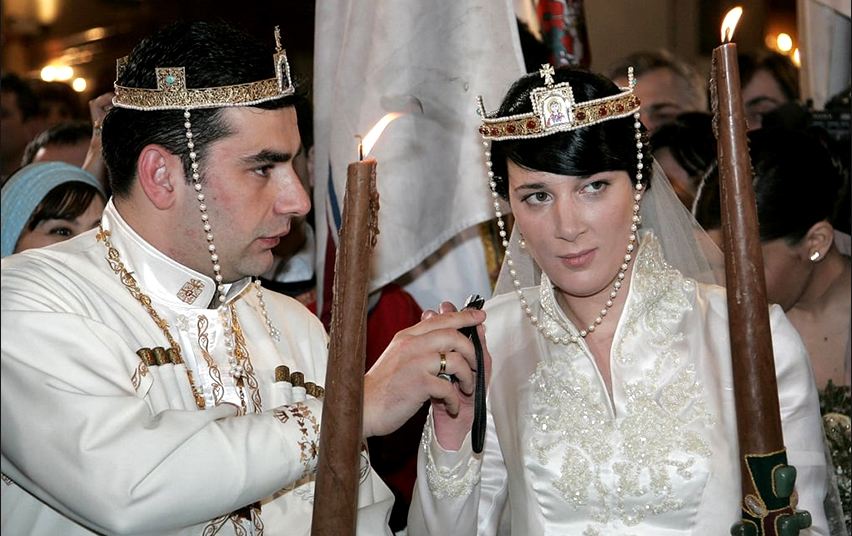

Two families claiming to be from Georgia’s Bagrationi royal dynasty have gone to court over a dispute regarding who is authorised to speak and give away gifts in the name of Georgia’s defunct monarchy.
Ana Bagration-Gruzinsky and her father Nugzar brought the case against Ana’s ex-husband — Davit Bagration-Mukhraneli. In their lawsuit, the two have demanded that Bagration-Mukhraneli stop speaking on behalf of the Georgian Royal Family without their permission.
The Bagrationi dynasty reigned over various Georgian kingdoms from the Middle Ages until the early 19th century when Georgia was annexed by the Russian Empire.
Though more than two centuries have passed since the monarchy was abolished, Bagrations claiming to be from the Gruzinsky and Mukhraneli lines have continued to dispute who is the sovereign head of the Georgian Royal House.
On 12 March, a panel of three judges began examining the complaints of Ana and Nugzar Bagration-Gruzinsky. In their suit, the two cited Bagration-Mukhraneli’s March 2017 visit to Kensington Palace in the UK.
According to the Royal House of Georgia website, which supports Davit Bagration-Mukhraneli’s claim to be the rightful head of the royal house, ‘Crown Prince Davit had wished to present the gift of the Grand Collar to Her Majesty the Queen on the occasion of Her Majesty’s Official 90th Birthday on 11 June 2016. The Crown Prince’s wish received the most gracious acceptance of Queen Elizabeth II.’
Speaking with Liberali on 11 March, the lawyer representing the Bagration-Gruzinskys, Levan Gorelashvili, pointed to an article in British tabloid the Daily Mail claiming that Bagration-Mukhraneli was selling honours. According to the story, ‘a donation of £850 would secure a knighthood, and £3,000 would ensure receipt of the Grand Collar’.
‘Davit [Bagration-Mukhraneli] named a concrete sum of money in exchange of which he was ready to grant them the collar’, Gorelashvili said.
On 12 March, historian Giorgi Otkhmezuri, who was invited to testify as an expert witness in court, was asked by the plaintiff’s lawyer to ‘recall in detail what happened in 1512’.
The trial took an unusual course as judges asked questions such as whether there was precedence in which heredity had not been passed onto the firstborn son of the monarch, or whether it was possible a king could have adopted a non-Bagrationi who later became king.
Attempting to prove the claims of their clients, lawyers from both sides questioned the authenticity of their opponents’ royal origins.
Prior to the trial, Davit Bagration-Mukhraneli’s lawyer, Levan Chkheidze, said that Nugzar Bagration-Gruzinsky was not Bagrationi at all, but was instead a Sikharulidze. He said that this had been proved by a DNA test conducted by the Patriarchate of the Georgian Orthodox Church.
He later elaborated that ‘testing secretly carried out 15 years ago by the Patriarchate’ studied the Bagrations’ bloodlines and found that ‘Mr Nugzar Bagrationi had no haplogroup. Bagrations have Q3A1A1, Siberian DNA, so to say’, Chkheidze said.
He quoted Gorelashvili as saying that Nugzar Bagrationi had a Georgian haplogroup, which, he said, proved that ‘Mr. Nugzar is not a Bagration’.
Gorelashvili dismissed the allegations. ‘This gossip hasn’t lasted long and the Patriarchate has dismissed this disinformation. How can a DNA test determine the last name of a person’, Gorelashvili said.
The Georgian Patriarchate advised the media to speak with the Scientific Centre of Ethno-Genetic Research, which conducted the DNA testing.
The head of the Centre, Giorgi Andriadze told Radio Tavisupleba that they were not linked with the Patriarchate. He confirmed that the Centre had carried out DNA tests of ‘1,200 family names throughout Georgia’, however, he did not clarify the results of Davit Bagration-Gruzinski’s tests, deeming it personal information.
‘I confirm that he has a very old Georgian gene, so great that it can be listed beside very gifted Georgian family names […] The information that he is a Sikharulidze is false and I can state this with full authority’, Andriadze said.
The case is scheduled to continue on 11 April.
Attempts to bring back the monarchy
In 2009, Davit Bagration-Mukhraneli married Ana Bagration-Gruzinsky in Georgia’s Trinity Cathedral at the initiative of the head of the Georgian Orthodox Church Patriarch Ilia II. Two years later, the couple had a son.
The Church, which has for years advocated restoring the monarchy, said this would only be possible if the two lines of the Bagrations were united through this marriage. The marriage, which was ‘the Patriarch’s dream of 20 years’, came to an end in 2013, when the couple divorced.
The Georgian Patriarch first voiced the idea of transforming Georgia into a constitutional monarchy in 2008. According to him, a referendum should be held in order to decide whether to bring the monarchy back or not. The idea came up again in 2017, after another suggestion by the Patriarch.
At the time, leaders of Georgia’s ruling Georgian Dream party said that they were considering turning Georgia into a constitutional monarchy.
‘We could think of Georgia as the oldest monarchy’, the Georgian Patriarch said in a sermon, adding that ‘this [a shift to constitutional monarchy] cannot happen today or tomorrow, but we must analyse the past, present, and future’.
Parliamentary Chair Irakli Kobakhidze and then-Legal Issues Committee Head Eka Beselia met with the Patriarch in June 2017 to discuss the initiative. Beselia confirmed that it would be possible to hold a plebiscite on the issue, adding that the Patriarch’s initiative was a ‘notable idea’, but that ‘people need to understand the idea first’.





